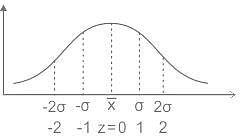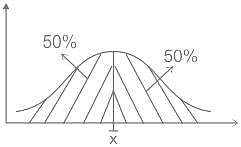Civil Engineering (CE) Exam > Civil Engineering (CE) Questions > In a ‘PERT’ analysis, if the prob...
Start Learning for Free
In a ‘PERT’ analysis, if the probability factor is negative, the chances of completing the project in time is
- a)Less than 50%
- b)Fifty-fifty %
- c)More than 50%
- d)Zero
Correct answer is option 'A'. Can you explain this answer?
Verified Answer
In a ‘PERT’ analysis, if the probability factor is negativ...

Probability factor

Where
 mean, σ = std. deviation.
mean, σ = std. deviation.- For z = 0, P(z) = 50%
- For z < 0, P(z) < 50%
- For z > 0, P(z) > 50%
In this probability distribution, the curve is symmetric about mean that is

The area covered under the entire curve is 1 unit. So area covered upto a point which is less than mean will be less than 50%.

The area covered under the entire curve is 1 unit. So area covered upto a point which is less than mean will be less than 50%.
Most Upvoted Answer
In a ‘PERT’ analysis, if the probability factor is negativ...
In a world affected by climate change, we can expect to see various impacts on the environment, society, and economy. Some of these impacts may include:
1. Rising temperatures: Climate change is expected to lead to rising global temperatures. This can result in heatwaves, droughts, and increased risk of wildfires. Higher temperatures can also disrupt ecosystems and cause biodiversity loss.
2. Changing precipitation patterns: Climate change can lead to changes in rainfall patterns, including more intense rainfall events and longer periods of drought. This can have significant impacts on agriculture, water availability, and the overall water cycle.
3. Sea-level rise: As temperatures rise, glaciers and ice caps melt, leading to an increase in sea levels. This can result in coastal erosion, flooding, and the displacement of coastal communities. It can also contaminate freshwater sources with saltwater intrusion.
4. Extreme weather events: Climate change is linked to an increase in extreme weather events such as hurricanes, typhoons, and cyclones. These events can cause widespread destruction, loss of life, and infrastructure damage.
5. Impact on ecosystems: Climate change can disrupt ecosystems and lead to shifts in species distribution and abundance. This can have cascading effects on biodiversity, food webs, and ecosystem services such as pollination and water purification.
6. Health impacts: Climate change can have adverse effects on human health, including increased heat-related illnesses, the spread of vector-borne diseases, and reduced access to clean water and sanitation.
7. Economic implications: Climate change can have significant economic implications, including increased costs for disaster response and recovery, decreased agricultural productivity, and the potential displacement of industries such as tourism and fishing.
8. Social and political consequences: Climate change can exacerbate existing social and political inequalities, leading to social unrest, migration, and conflicts over resources such as water and land.
9. Impacts on vulnerable populations: Certain populations, such as low-income communities, indigenous peoples, and small island states, are particularly vulnerable to the impacts of climate change. They may face disproportionate risks and limited resources to adapt and recover.
Overall, climate change is a complex global issue that requires urgent action to mitigate its impacts and adapt to the changes that are already occurring.
1. Rising temperatures: Climate change is expected to lead to rising global temperatures. This can result in heatwaves, droughts, and increased risk of wildfires. Higher temperatures can also disrupt ecosystems and cause biodiversity loss.
2. Changing precipitation patterns: Climate change can lead to changes in rainfall patterns, including more intense rainfall events and longer periods of drought. This can have significant impacts on agriculture, water availability, and the overall water cycle.
3. Sea-level rise: As temperatures rise, glaciers and ice caps melt, leading to an increase in sea levels. This can result in coastal erosion, flooding, and the displacement of coastal communities. It can also contaminate freshwater sources with saltwater intrusion.
4. Extreme weather events: Climate change is linked to an increase in extreme weather events such as hurricanes, typhoons, and cyclones. These events can cause widespread destruction, loss of life, and infrastructure damage.
5. Impact on ecosystems: Climate change can disrupt ecosystems and lead to shifts in species distribution and abundance. This can have cascading effects on biodiversity, food webs, and ecosystem services such as pollination and water purification.
6. Health impacts: Climate change can have adverse effects on human health, including increased heat-related illnesses, the spread of vector-borne diseases, and reduced access to clean water and sanitation.
7. Economic implications: Climate change can have significant economic implications, including increased costs for disaster response and recovery, decreased agricultural productivity, and the potential displacement of industries such as tourism and fishing.
8. Social and political consequences: Climate change can exacerbate existing social and political inequalities, leading to social unrest, migration, and conflicts over resources such as water and land.
9. Impacts on vulnerable populations: Certain populations, such as low-income communities, indigenous peoples, and small island states, are particularly vulnerable to the impacts of climate change. They may face disproportionate risks and limited resources to adapt and recover.
Overall, climate change is a complex global issue that requires urgent action to mitigate its impacts and adapt to the changes that are already occurring.

|
Explore Courses for Civil Engineering (CE) exam
|

|
Similar Civil Engineering (CE) Doubts
In a ‘PERT’ analysis, if the probability factor is negative, the chances of completing the project in time isa)Less than 50%b)Fifty-fifty %c)More than 50%d)ZeroCorrect answer is option 'A'. Can you explain this answer?
Question Description
In a ‘PERT’ analysis, if the probability factor is negative, the chances of completing the project in time isa)Less than 50%b)Fifty-fifty %c)More than 50%d)ZeroCorrect answer is option 'A'. Can you explain this answer? for Civil Engineering (CE) 2025 is part of Civil Engineering (CE) preparation. The Question and answers have been prepared according to the Civil Engineering (CE) exam syllabus. Information about In a ‘PERT’ analysis, if the probability factor is negative, the chances of completing the project in time isa)Less than 50%b)Fifty-fifty %c)More than 50%d)ZeroCorrect answer is option 'A'. Can you explain this answer? covers all topics & solutions for Civil Engineering (CE) 2025 Exam. Find important definitions, questions, meanings, examples, exercises and tests below for In a ‘PERT’ analysis, if the probability factor is negative, the chances of completing the project in time isa)Less than 50%b)Fifty-fifty %c)More than 50%d)ZeroCorrect answer is option 'A'. Can you explain this answer?.
In a ‘PERT’ analysis, if the probability factor is negative, the chances of completing the project in time isa)Less than 50%b)Fifty-fifty %c)More than 50%d)ZeroCorrect answer is option 'A'. Can you explain this answer? for Civil Engineering (CE) 2025 is part of Civil Engineering (CE) preparation. The Question and answers have been prepared according to the Civil Engineering (CE) exam syllabus. Information about In a ‘PERT’ analysis, if the probability factor is negative, the chances of completing the project in time isa)Less than 50%b)Fifty-fifty %c)More than 50%d)ZeroCorrect answer is option 'A'. Can you explain this answer? covers all topics & solutions for Civil Engineering (CE) 2025 Exam. Find important definitions, questions, meanings, examples, exercises and tests below for In a ‘PERT’ analysis, if the probability factor is negative, the chances of completing the project in time isa)Less than 50%b)Fifty-fifty %c)More than 50%d)ZeroCorrect answer is option 'A'. Can you explain this answer?.
Solutions for In a ‘PERT’ analysis, if the probability factor is negative, the chances of completing the project in time isa)Less than 50%b)Fifty-fifty %c)More than 50%d)ZeroCorrect answer is option 'A'. Can you explain this answer? in English & in Hindi are available as part of our courses for Civil Engineering (CE).
Download more important topics, notes, lectures and mock test series for Civil Engineering (CE) Exam by signing up for free.
Here you can find the meaning of In a ‘PERT’ analysis, if the probability factor is negative, the chances of completing the project in time isa)Less than 50%b)Fifty-fifty %c)More than 50%d)ZeroCorrect answer is option 'A'. Can you explain this answer? defined & explained in the simplest way possible. Besides giving the explanation of
In a ‘PERT’ analysis, if the probability factor is negative, the chances of completing the project in time isa)Less than 50%b)Fifty-fifty %c)More than 50%d)ZeroCorrect answer is option 'A'. Can you explain this answer?, a detailed solution for In a ‘PERT’ analysis, if the probability factor is negative, the chances of completing the project in time isa)Less than 50%b)Fifty-fifty %c)More than 50%d)ZeroCorrect answer is option 'A'. Can you explain this answer? has been provided alongside types of In a ‘PERT’ analysis, if the probability factor is negative, the chances of completing the project in time isa)Less than 50%b)Fifty-fifty %c)More than 50%d)ZeroCorrect answer is option 'A'. Can you explain this answer? theory, EduRev gives you an
ample number of questions to practice In a ‘PERT’ analysis, if the probability factor is negative, the chances of completing the project in time isa)Less than 50%b)Fifty-fifty %c)More than 50%d)ZeroCorrect answer is option 'A'. Can you explain this answer? tests, examples and also practice Civil Engineering (CE) tests.

|
Explore Courses for Civil Engineering (CE) exam
|

|
Signup for Free!
Signup to see your scores go up within 7 days! Learn & Practice with 1000+ FREE Notes, Videos & Tests.
























